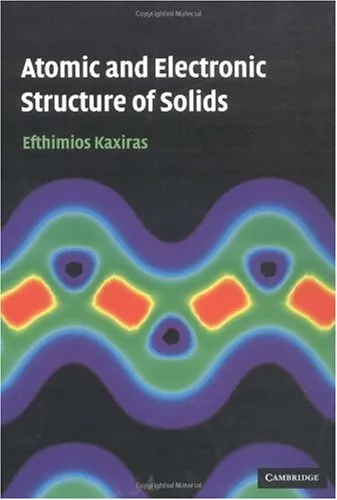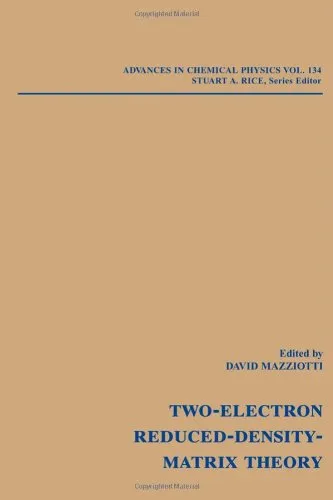The Nature of the Chemical Bond and the Structure of Molecules and Crystals 3rd edition
5.0
بر اساس نظر کاربران

شما میتونید سوالاتتون در باره کتاب رو از هوش مصنوعیش بعد از ورود بپرسید
هر دانلود یا پرسش از هوش مصنوعی 2 امتیاز لازم دارد، برای بدست آوردن امتیاز رایگان، به صفحه ی راهنمای امتیازات سر بزنید و یک سری کار ارزشمند انجام بدینکتاب های مرتبط:
خلاصهای جامع از کتاب
کتاب 'The Nature of the Chemical Bond and the Structure of Molecules and Crystals 3rd edition' به عنوان یک اثر بنیادین در شیمی و فیزیک مولکولی، دیدگاههای جدیدی را در مورد چگونگی ارتباط اتمها و تشکیل مولکولها ارائه میدهد. این کتاب به بررسی عمیق مفهوم پیوندهای شیمیایی میپردازد و چگونگی ترکیب و شکلگیری ساختارهای پیچیده از اتمهای ساده را توضیح میدهد. در حالی که نسخه سوم این کتاب بهطور چشمگیری بهروزرسانی شده است، همچنان اصول پایهای را که از ابتداییترین مفاهیم شروع شده و به نظریههای پیشرفتهتر مانند ترکیبهای همگون و هتروجنی میپردازد، پوشش میدهد. اصول بولینگ و هیدروژنی مانند Resonance و Electronegativity در این نسخه بهطور مفصل تجزیه و تحلیل شدهاند.
نکات کلیدی کتاب
- شرح دقیق پیوندهای covalent و ionic
- مفهوم Resonance و کاربردهای آن در شیمی مولکولی
- بررسی نظریههای روابط میان الکترونها و هستهها در پیوندهای متنوع
- نقش Electronegativity در تشخیص و تحلیل قدرت پیوندها
- آشنایی با ساختارهای کریستالی و کاربردهای آنها در صنعت و علم مواد
نقلقولهای معروف از کتاب
"پیوند شیمیایی، نه تنها نیرویی است که مولکولها را کنار هم نگه میدارد، بلکه گویای گذشته، حال و آینده یک ماده است."
"بازتابهای اتمی و مولکولی همانند پایههای پلهایی هستند که علم مواد را به دنیای ما متصل میکنند."
چرا این کتاب مهم است
کتاب 'The Nature of the Chemical Bond and the Structure of Molecules and Crystals' یکی از ستونهای اصلی ادبیات شیمی در قرن بیستم محسوب میشود. این اثر نه تنها به عنوان یک منبع ارزشمند برای دانشجویان و پژوهشگران شناخته میشود، بلکه به کسانی که در رشتههای مرتبط با مهندسی شیمی و مواد، بیوشیمی، و فیزیک کار میکنند، پایه های محکم علمی ارائه میدهد. این کتاب به مطالعه دقیق و کاربردی کردن نظریههای پایهای درباره پیوندها و ساختارها میپردازد و به دانشمندان کمک میکند تا مواد جدیدی با ویژگیهای مطلوبتر ایجاد کنند.
Introduction to 'The Nature of the Chemical Bond'
'The Nature of the Chemical Bond and the Structure of Molecules and Crystals' is a seminal work in the field of chemistry authored by Linus Pauling. Presented here in its third edition, this book continues to illuminate the fundamental principles governing chemical bonding and the architectural intricacies of molecules and crystals. By integrating principles of quantum mechanics and empirical data, this text elucidates the forces that shape and bind atoms into structures both simple and complex. As one of the pillars of modern chemistry, this book has educated and inspired generations of chemists, influencing fields as diverse as biology, materials science, and pharmacology.
Detailed Summary of the Book
In this edition, the text begins with an exploration of basic theories of atomic structure and the role of electron configurations in establishing chemical bonds. It advances into a discussion about the nature of ionic and covalent bonds, elucidated by quantum mechanical principles. The book provides detailed accounts of bond energies, bond lengths, and angles, and delves into the resonance systems—an area of particular contribution by Pauling himself.
Further chapters expand into the nature of molecular orbitals and their impact on the electronic structure of molecules. Pauling introduces the concept of hybridization — a crucial aspect of the theory — to explain the geometry of molecular structures. Discussions are enriched with extensive data supporting theoretical models, including X-ray crystallography results that map out the three-dimensional structure of molecules and crystals.
The final sections of the book are dedicated to more complex concepts such as the van der Waals forces, hydrogen bonding, and the role of metals in biological systems, all of which have profound implications for both organic and inorganic chemistry.
Key Takeaways
- A comprehensive understanding of different types of chemical bonds and their formation.
- Insight into the role of quantum mechanics in explaining chemical phenomena.
- Introduction and application of molecular orbital and hybridization theories.
- Extensive empirical data that substantiates theoretical propositions.
- The importance of three-dimensional molecular structures in determining chemical properties and reactions.
Famous Quotes from the Book
"I have always been unsatisfied by anything less than an explanation of the meaning of relations among facts."
"Chemical substances as we behold them are not arrangements of static building blocks; they are elaborately woven tapestries of dynamic activity."
Why This Book Matters
'The Nature of the Chemical Bond' is not merely a textbook, but a cornerstone of chemical education that has profoundly shaped the understanding of chemistry. It introduces readers to a comprehensive view of chemical structures, emphasizing the importance of bonding theories touched by quantum mechanics. The clarity and depth with which Pauling articulates complex concepts make this text an invaluable resource for both students and seasoned chemists. Its influence extends beyond chemistry, impacting biomolecular sciences and providing insight applicable to diverse disciplines.
Embraced for its pioneering approach to chemical bonding, this book matters because it empowers readers to conceptualize chemical phenomena at a foundational level, bridging the gap between theoretical models and practical application. It is an essential read for anyone dedicated to exploring the atomic and molecular underpinnings of the material world.
دانلود رایگان مستقیم
شما میتونید سوالاتتون در باره کتاب رو از هوش مصنوعیش بعد از ورود بپرسید
دسترسی به کتابها از طریق پلتفرمهای قانونی و کتابخانههای عمومی نه تنها از حقوق نویسندگان و ناشران حمایت میکند، بلکه به پایداری فرهنگ کتابخوانی نیز کمک میرساند. پیش از دانلود، لحظهای به بررسی این گزینهها فکر کنید.
این کتاب رو در پلتفرم های دیگه ببینید
WorldCat به شما کمک میکنه تا کتاب ها رو در کتابخانه های سراسر دنیا پیدا کنید
امتیازها، نظرات تخصصی و صحبت ها درباره کتاب را در Goodreads ببینید
کتابهای کمیاب یا دست دوم را در AbeBooks پیدا کنید و بخرید
1270
بازدید5.0
امتیاز0
نظر98%
رضایتنظرات:
5.0
بر اساس 0 نظر کاربران
Questions & Answers
Ask questions about this book or help others by answering
No questions yet. Be the first to ask!














